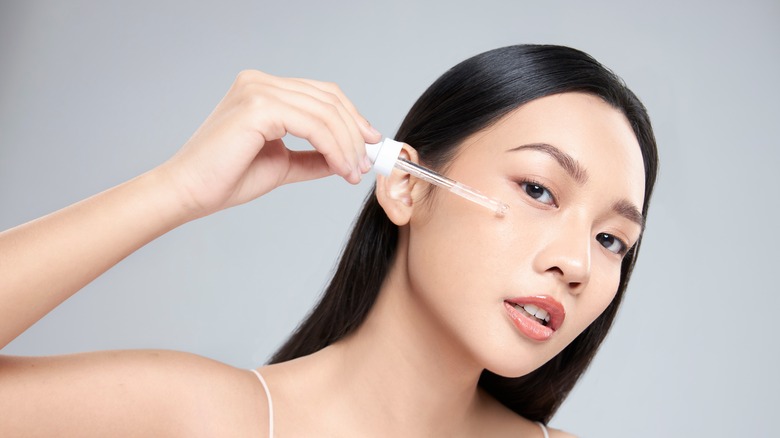Hyaluronic Acid Or Squalane: Which Is Better For Dry Skin?
We may receive a commission on purchases made from links.
If you have dry, itchy, flaky skin, you know the struggle to keep your skin hydrated. Aside from just being born with naturally dry skin, xeroderma can be caused by multiple sources, such as aging, cold weather, or dehydration. While the simple solution to dry skin brought on by winter would be to lather up the lotion or try slugging, it can feel a bit heavy on the skin during the warmer months. Some derms recommend exfoliation to remove flaky, dead skin, which often works. Chemical exfoliants like glycolic or lactic acid can be super effective in brightening and smoothing out the skin. However, if you're starting out on a retinoid and you're going through the purging period, you may want to put the exfoliants aside.
Instead of slogging away the dead, dry skin, use gentle ingredients that focus on hydrating the skin. Squalane and hyaluronic acid, both great ingredients for dry, sensitive skin, work on boosting moisture levels in the skin. But which one is right for you?
How do hyaluronic acid and squalane work?
Hyaluronic acid is a naturally-occurring substance found in the body. Viscous and smooth, it's found in the eyes and joints, acting as a lubricant for them. It can also be taken by mouth via supplement, helping with dry eyes and acid reflux. As for hyaluronic acid's skincare benefits, it hydrates the skin by pulling moisture from the environment into the skin. It can absorb over 1,000 times its weight in water, allowing it to retain moisture in the skin. A natural antioxidant, squalane mirrors the skin's natural oils, which allows it to help with keeping moisture locked into the skin. Squalene boosts collagen production within the skin and fights off skin damage.
While both ingredients keep skin moisturized, hyaluronic acid only works when used in environments where moisture is present in the air. If applied to dry skin in dry climates, it will search for water deeper within the skin, drying out your skin rather than keeping it hydrated. You also need to seal it with a moisturizer to prevent water loss. As an emollient, squalane creates a barrier to keep moisture trapped, meaning that hydration must also be applied to the skin in the first place. Since they only require water application beforehand, squalane is more suitable for all climates.
Shop the best hyaluronic and squalane products
Some combine hyaluronic acid and squalane to cover all the bases for maximum hydration. Fortunately, the Honest Beauty Hydrogel Cream already does it for you. Formulated with both powerhouse ingredients in this lightweight moisturizer, it soothes skin with its moisturizing jojoba esters and refreshing feel. For a facial cleanser that removes makeup without banishing moisture, try The Ordinary Squalane Cleanser. Made with plant-derived squalane, this cleanser uses an emulsion formula to remove dirt and makeup easily while keeping the skin soft and hydrated. Vegan and oil-free, it's gentle enough for everyday use.
The Drunk Elephant B-Hydra Intensive Hydration Serum contains hyaluronic acid and Provitamin B5, another humectant, drawing moisture in to keep extremely parched skin hydrated. It also contains pineapple ceramide, which helps with uneven texture and discoloration. If you've been suffering from dry patches on the body, try the Biossance Squalane + Enzyme Sugar Body Scrub. Vegan and cruelty-free, this environmentally-friendly scrub uses pomegranate enzymes to chemically exfoliate dead skin while melting sugar crystals to slough away dryness.

